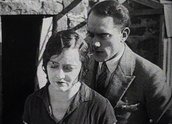


The Far Paradise (1928)
Synopsis
Cherry Carson (Isabel McDonagh billed as 'Marie Lorraine’), who has spent years overseas, is on her way home when she meets and is attracted to Peter Lawton (Paul Longuet), son of attorney-general Howard Lawton (John Faulkner). While Peter’s father welcomes him home, Cherry receives no such welcome from her father, James Carson (Gaston Mervale), whose shady business deals are being investigated by the attorney-general.
After Cherry and Peter meet again at a masked ball, Carson orders his daughter to see no more of Peter. Becoming destitute and alcoholic, Carson seeks refuge with his daughter on a remote rural farm. Peter tracks them down and tells Cherry about the full extent of Carson’s criminal activities. Cherry confronts her father, who dies of a heart attack. Soon afterward Peter and Cherry are married.
Curator’s notes
In the mid-to-late 1920s the McDonagh sisters were a highly effective team. At the time of their first and second feature films their work had a well-crafted contemporary look, a sense of energy and in the midst of an Australian feature film industry struggling for survival, an emotional appeal that attracted publicity, local film trade acceptance and audiences. These first and second films were Those Who Love (1926) and The Far Paradise (1928).
Set for the most part in fictional, could-be-anywhere cities, all three of the McDonagh silent films (the third was The Cheaters (silent), 1929) told of young love challenged by parental differences, restricted by the demands of family loyalty and the corrosive impact of social prejudice. These tried-and-true melodramatic ingredients had featured in countless other films and plays, but Those Who Love and The Far Paradise had a sense of difference for Australian cinema. They had, for a start, urban settings, and more than most other Australian features of their time, a look and feel of modernity. Supporting this was director Paulette McDonagh’s understanding of contemporary screen grammar, especially how shot composition and editing could contribute to cinema’s emotional rhythms.
Those Who Love earned enough money to fund the £2000 budget of the McDonaghs’ second feature, The Far Paradise. The new film was shot in two weeks at Drummoyne House and the Australasian Films Studio at Bondi Junction (Sydney), and on location at Penrith, the Burragorang Valley and in Melbourne. The cast included three experienced screen actors, John Faulkner, Gaston Mervale and Arthur McLaglen.
The McDonaghs’ silent films all benefited from naturalistic performances. In this regard, Isabel (billed as Marie Lorraine) was a pivotal figure, not only investing her roles with consistent realism but also influencing the work of others. The best sequence in The Far Paradise is a breakfast between Cherry and her father James Carson, drawing much of its impact from the use of extended close-ups to record Isabel’s reactions to things said and done.
Time and again, such reactions – such as Cherry’s response to the unwanted advances of her father’s sleazy business partner, and the unwelcome arrival of Peter at a farm on which Cherry and her father have tried to hide – have a deep emotional truth that transforms what might have been merely melodramatic moments into scenes of conviction. The Sydney Morning Herald, in reviewing the film on 20 June 1928, observed of Isabel’s performance:
She has the power of expressing much feeling with a minimum of outward show. Her face is beautiful, yet there is character in it … It would be interesting to see her powers displayed in a less melodramatic vehicle.
Another of The Far Paradise’s strengths is the way in which it tackles attraction between women and men. In scenes of Cherry’s and Peter’s first meeting, Paulette McDonagh as director is not afraid to show how women and men might actually admire each other. During Cherry’s and Peter’s first conversation, this is communicated through sustained looks and a close-up of caressing hands. Even a subsidiary character such as the hero’s friend Lee (Arthur Clarke) is allowed an extended reaction shot as Cherry, whom he has just met for the first time, walks away into the distance.
When The Far Paradise premiered to a well-attended season at Sydney’s Regent Theatre in July 1928, The Sydney Morning Herald found that it showed ’decision in every detail, and both the scenario and the captions are straightforwardly forceful’. Smith’s Weekly commented that the film:
has a smoothness and finish rare in Australian films … It has something of the art that conceals art; that makes you forget you are watching a film and so lets you judge the drama on its own merits.
There are, to be sure, small technical problems with The Far Paradise, including several shots that ‘cross the line’ in continuity terms, resulting in non-matching close-ups where characters supposed to be looking at each other are framed and edited as if looking in opposite directions. The film’s surviving physical state is also something of a drawback, with projection wear, deterioration and the loss of an entire 10-minute reel in the film’s final third diminishing the impact of what once must have been.
Otherwise The Far Paradise remains an enduringly potent work, containing as it does a far more compelling emotional core than the McDonaghs’ next and most complete surviving feature, The Cheaters.
- Overview
- Curator’s notes
- Video 3 clips
- Principal credits
- Find a copy
- Make a comment
- Map
- Add your review



